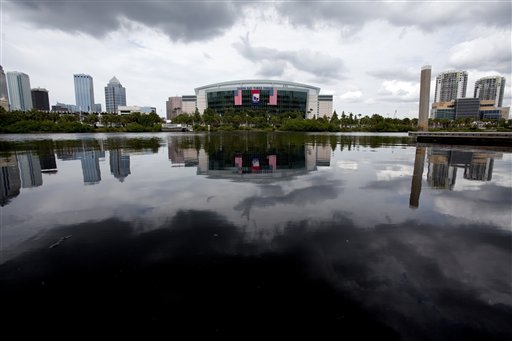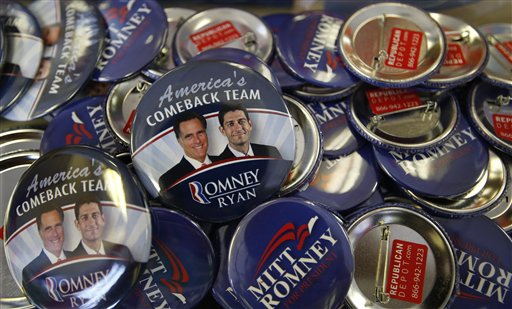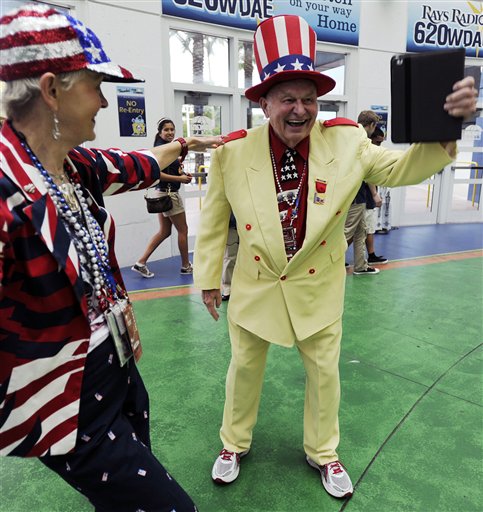TAMPA, Fla. — Mitt Romney’s Republican National Convention sputters to life with the lonely banging of a gavel in a mostly empty hall, hardly the opening splash intended for the nation. With a sprawling and strengthening storm bearing down on the region, the party hastily rewrote the convention script to present the extravaganza’s prime rituals and headline speakers later in the week — Tropical Storm Isaac willing.
Nothing was certain Monday as the storm carved an unpredictable path toward the Gulf of Mexico, forcing planners to compress four days of events into three and otherwise improvise.
It was a complication, at best, for a party determined to cast the close election as a referendum on President Barack Obama’s economic stewardship and Romney as the best hope for jobs and prosperity.
From New Hampshire, where he and his wife, Ann, rehearsed their convention speeches in a high school auditorium, Romney expressed worry about the people in Isaac’s way while predicting a “great convention” nonetheless. Other officials put on a brave face, too.
But Sally Bradshaw, a Florida Republican and longtime senior aide to former Florida Gov. Jeb Bush, was not so sanguine. “It’s a mess all around and it’s fraught with risk,” she said. “It’s not good for anybody — particularly the people impacted by the storm.”
The concern was two-fold: that Tampa, hosting thousands of GOP delegates, would get sideswiped by the storm; and that it would be unseemly to engage in days of political celebration if Isaac made a destructive landfall anywhere on U.S. soil.
“You can tone down the happy-days-are-here-again a bit,” said Rich Galen, a veteran Republican consultant in Washington. “Maybe you don’t have the biggest balloon drop in history.”
Said Reince Priebus, the Republican National Committee chairman: “We’re moving forward, but we are going to be nimble.” Real estate developer Donald Trump, who had been scheduled to speak Monday, was dropped from the convention program because of the reshuffling.
Republicans hoped another distracting tempest would blow over, too, concerning abortion. The Obama campaign and its allies have doubled down in efforts to exploit remarks more than a week ago by Rep. Todd Akin, the GOP’s candidate for a Senate seat from Missouri, that a woman’s body has a way of preventing pregnancy in the case of a “legitimate rape.” The claim is unsupported by medical evidence. The congressman quickly apologized but resisted Romney’s pressure to drop out of the race.
Romney, in a Fox interview, said in comments broadcast Sunday that the fallout over Akin’s remarks “hurts our party and I think is damaging to women,” adding: “It really is sad, isn’t it? With all the issues that America faces, for the Obama campaign to continue to stoop to such a low level.”
In the reworked convention schedule released early Sunday evening, organizers planned a pro forma opening Monday afternoon, lasting no more than five minutes or so. Priebus was to gavel the convention to order, then immediately recess. Few delegates were expected to attend. In the only bit of convention-hall theater, a debt clock was to be set in motion, to tally the nation’s red ink during the convention.
Speakers who had been scheduled for Monday were to start making the case against Obama, under the day’s theme, “we can do better.” That theme now will be threaded through the following three days, said Romney adviser Russ Schriefer, in charge of the convention’s planning. “Even though the days will be abbreviated, I absolutely believe we’ll be able to get our message out,” he said.
The roll call of state delegations affirming Romney as the party’s nominee now is to unfold Tuesday, an evening capped by speeches from Ann Romney and an assortment of GOP governors. Romney’s running mate, Rep. Paul Ryan, gets the prime-time spotlight Wednesday and Romney closes out the spectacle Thursday night, his springboard into the final leg of the contest. That’s all if the storm brings no further complications.
So far, many delegates were taking the shakeup in stride. “People are pretty resilient, and people knew going in that there were some weather issues,” said Pat Shortridge, the Minnesota state GOP chairman, from Lino Lakes, Minn. “I don’t think it’s dampened enthusiasm.”
Weather was recognized as potential trouble when Republicans chose to hold their convention in politically vital Florida during hurricane season, a decision made well before Romney locked up the nomination. And it’s clear that memories of Hurricane Katrina, and the failure of a Republican administration to respond effectively to its Gulf Coast devastation in 2005, are hanging over Tampa now. Republicans have been so sensitive to the political risks from natural disasters that they delayed the start of their national convention by a day in 2008, when Hurricane Gustav bore down on the Gulf, far from their meeting in Minnesota.
And it surely wasn’t lost on Tampa convention organizers that a gathering storm gave Obama an opportunity to show leadership. As the forecast worsened, the president directed the Federal Emergency Management Agency to help.
“The president also told the governor to let him know if there are any unmet needs or additional resources the administration could provide, including in support of efforts to ensure the safety of those visiting the state for the Republican National Convention,” the White House said Sunday.
Both sides grappled with how to conduct their politicking in the face of the storm. Vice President Joe Biden, who had been prepared to make as much political hay as possible over the Republican convention, canceled a campaign swing through Florida on Monday and Tuesday.
Polls find a tight race, and it’s one that is likely to be settled in a small number of battleground states.
An estimated $500 million has been spent on television commercials so far by the two candidates, their parties and supporting outside groups, nearly all of it in Florida, North Carolina, Virginia, New Hampshire, Ohio, Iowa, Colorado and Nevada. Those states account for 100 electoral votes out of the 270 needed to win the White House. Republicans hope to expand the electoral map to include Pennsylvania, Michigan, perhaps Ryan’s Wisconsin and even Minnesota, states with 68 electoral votes combined.
All four are usually reliably Democratic in presidential campaigns. Yet Romney has a financial advantage over the president, according to the most recent fundraising reports, and a move by the Republicans into any of them could force Obama to dip into his own campaign treasury in regions he has considered relatively safe.
Republican office-holders past and present said the economy is the key if Romney is to expand his appeal to women and Hispanic voters.
“We have to point out that the unemployment rate among young women is now 16 percent, that the unemployment rate among Hispanics is very high, that jobs and the economy are more important, perhaps, than maybe other issues,” said Arizona Sen. John McCain, who lost to Obama in 2008.
Bush agreed, saying that Romney “can make inroads if he focuses on how do we create a climate of job creation and economic growth.” If he succeeds, “I think people will move back towards the Republican side,” the former Florida governor added.
Obama leads Romney among female voters and by an overwhelming margin among Hispanics, but trails substantially among men.
Send questions/comments to the editors.





Comments are no longer available on this story